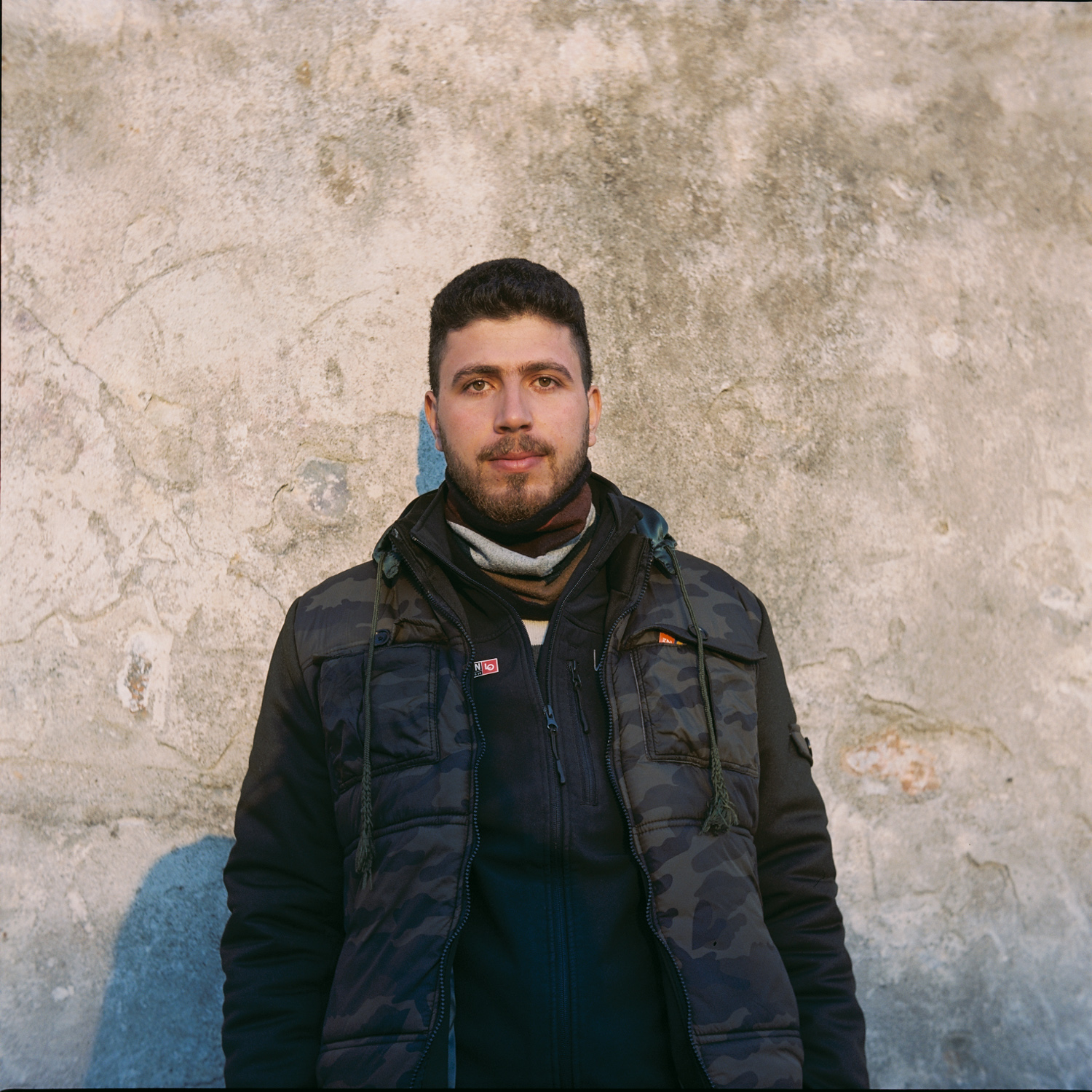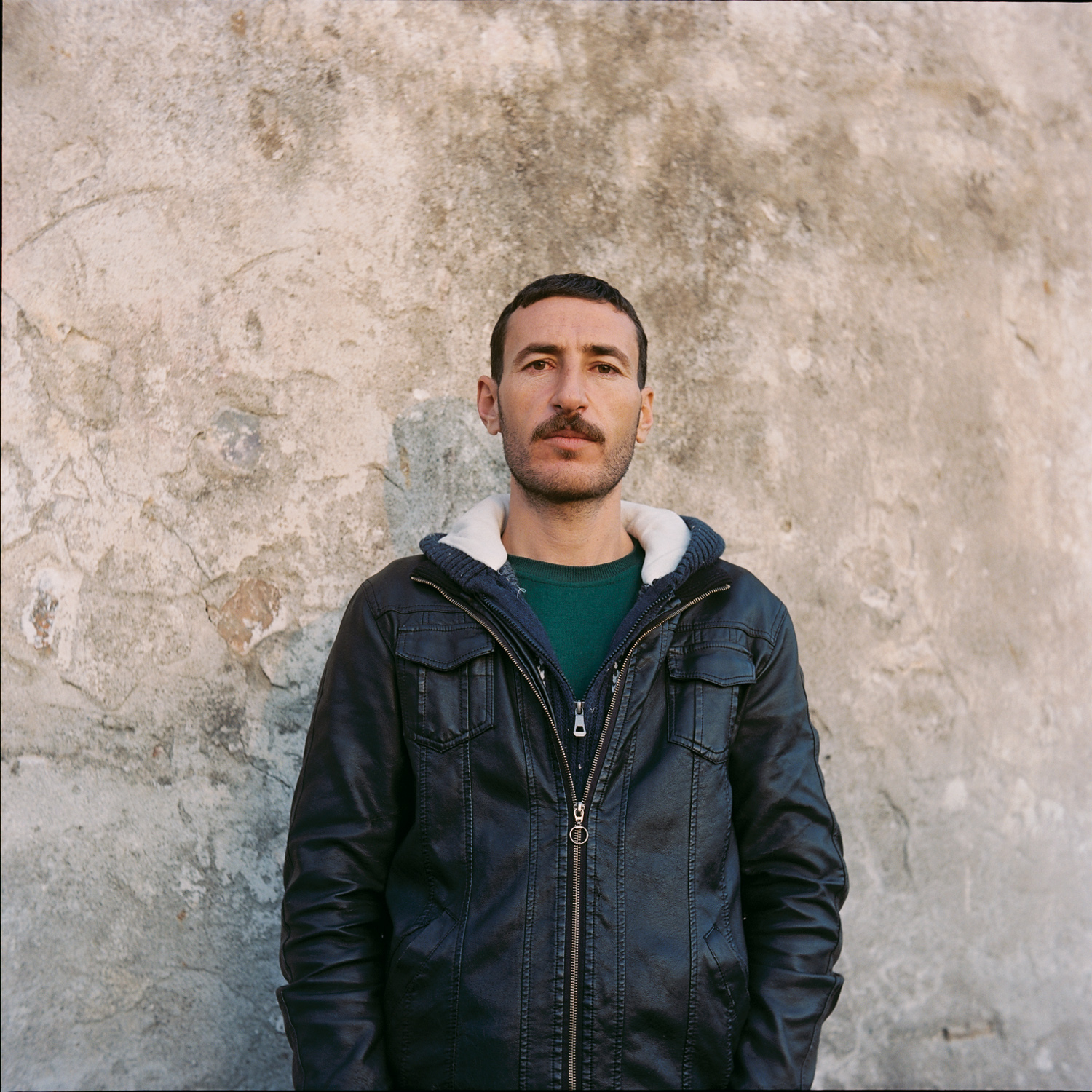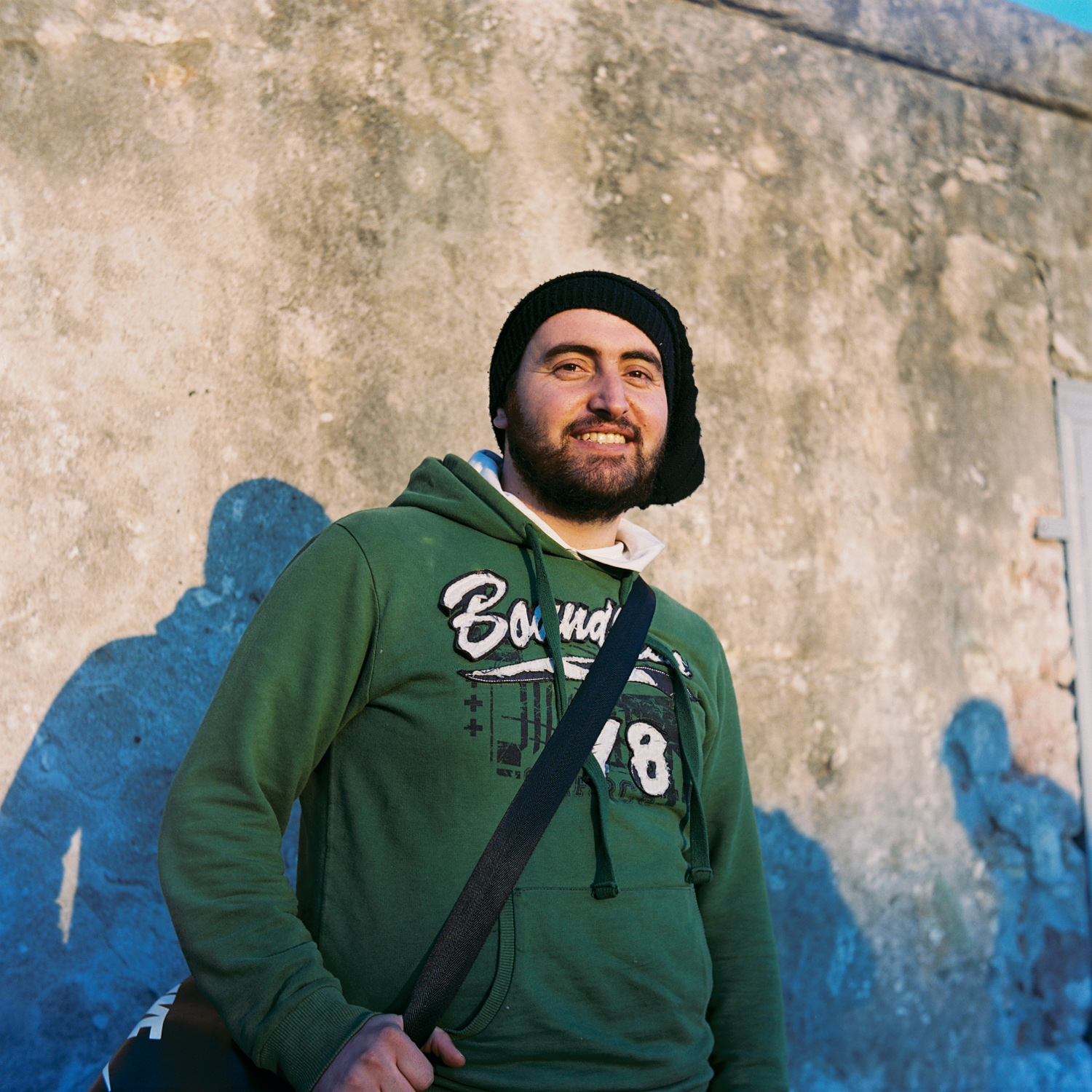Rami (L), brother Khaled (R) and their cousin Mohammad (center) are from Syria. Lesvos, Greece, February 2016.
Rami from Syria landed in Lesvos with his brother Khaled, sister Nawal and cousin Mohammad in February 2016.
Photos & Interviews by Talitha Brauer, Translation by Shady Khella
The air was brisk but comfortable in the early February sunshine. I was outside Moria camp on Lesvos Island, where independent volunteers at Better Days for Moria had set up tents, one where people could receive medical care, another where children could play, and others for serving food and tea.
I was asking a Syrian couple whether I could interview them, when their friends joined us. They were two brothers, a sister, and their cousin, en route to Germany. The men were glad to be photographed with their faces shown — they told me it was their introduction to Germany, where they hoped to soon reside.
Their interview took place before the EU-Turkey Joint Action Plan, when refugees were still free to travel.
Rami from Syria. Lesvos, Greece, February 2016.
Rami spoke to me about how it all began.
Rami: We left our homes 4 months after the revolution started. We left the country for Amman, Jordan a little over a year ago, and then we flew to Turkey. We have four family members in Germany and three (daughters) in Turkey. We hope we can live in Germany.
The revolution started in a peaceful way. It stayed peaceful for 7 or 8 months. The whole world knows that. We were asking for freedom.
Then Islamists would come, knock on the door and tell us, “You are fanatics.” We would tell them, “We just want peace.” But the next day, they would knock again and tell us the same thing.
My brother Khaled here studies psychology. Once, we were in a demonstration in Hama, where there were between 70,000 to 150,000 people — that’s just an estimate, but no less than 70,000. The army shot around 700 people, even though it was a 100% peaceful demonstration. Not one of us had a weapon; if there had been someone with a weapon, we wouldn’t have let him be among us.
On that day the army killed around 700 or 720 people from 20 meters away. 300 of them were children.
Khaled: On that day he’s speaking of, I was able to smell the blood for three full days. I keep thinking of people dying, and seeing the blood.
Rami: We held banners that said, “The people want the regime to fall”. This is what the revolution was like; everybody had signs like these. This was on the June 4th, 2011.
Khaled: I will never forget this date. I could even tell you the hour.
Rami: It was really hard because it wasn’t something hidden, it was out in the open. You could see it from the balconies. We carried a lot of children. Children of 15, 12, 10 years of age. There were around 200–250.
He (Bashar) was prepared for the streets and places we were going. He closed certain streets so no one would escape. He was prepared for it. The traffic police warned us. They told us not to go.
I could talk for 2–3 weeks. What do you expect with this regime? They were bombing schools with planes.
Nawal from Syria. Lesvos, Greece, February 2016.
Nawal and I didn’t get a chance to speak one-on-one, but she posed for me to make a portrait of her hands.
Khaled from Syria. Lesvos, Greece, February 2016.
Khaled then picked up the story from his perspective.
Khaled: When the events in Syria started, I was in my first year of college. At first, I didn’t really give my studies much attention, but then I decided to give it my all and actually finished with the best grades in our school.
After that Friday when the children were killed, I left Syria. I couldn’t stay there any longer. I would go home and smell blood there. The smell wasn’t really there, but I could smell it anyway.
So I left Syria, and continued my studies in sociology. And this major is a good choice. I could use sociology to help Syria, because the Syrian people are suffering a lot and have many problems. Wanting to continue my studies is what made me leave, although there was still a lot going on at home with the revolution.
It’s hard to study about Syrian society while the events are still ongoing. All my research was on Syria and the ongoing events there. These events also led me to study economics, because Syrian economics needs a lot of work, specifically social economics (which combines both of my studies).
I want to go specifically to Germany to continue my studies and get a Doctorate degree in economics and social economics. Syria needs this a lot. My research topic was “The Effects of the Syrian Problem on Syrian Children in Education” and I took Goethe-Damascus as an example.
We are people from the heart of the event, from the centre — this gives me a deeper understanding of these topics. I couldn’t change the political situation, so I decided to focus on my studies at a higher level in order to make a social & cultural change.
Mohammad from Syria. Lesvos, Greece, February 2016.
Mohammad, the cousin of Rami, Nawal & Khaled, was a prisoner under Bashar’s regime.
Mohammad: I left Syria 2 months ago. My hometown is Hama. I left it three and a half years. I went to the countryside in Syria, to a part that was not under Bashar’s regime. I was a prisoner under his regime, but I got out early and so I had to leave Hama in order to not get rearrested. The first time I was in prison, I was there for four and a half months, and the second time was only for 3 days.
I was arrested because I filmed people demonstrating and was involved with media — photographing content for news stations like Al Jazeera.
I was actually supposed to be sentenced to death, but in Syria any problem can be solved with money. So I paid money and got out of prison, otherwise I couldn’t have left. Even if somebody committed murder, they could pay money and get out of jail.
At the time, I was doing my Bachelor’s and I wanted to be a surgeon. After I left Hama, I was still filming people and how they suffered from the regime and how the government planes were bombing and shooting residential areas. I sent my photos and footage to news channels like Al Jazeera.
The second time I was arrested (again because of joining protests), they made a mistake and let me out early; they had me confused me with another guy and they released me. Two friends of mine were arrested at the same time as I was and they were killed in the place where we were held captive. They died from all the torture.
I lived three and a half years outside of Hama, still living in fear of the regime. Later even Iran and Russia came and killed people with the excuse of killing the extremists. There are even Afghani soldiers there who are paid to come; they are “paid killers”.
They all come with the excuse of killing the terrorists and extremists, and they just end up killing the Syrian people.
The Russian Airforce was even one of my reasons for leaving Syria. Bashar’s Airforce wasn’t as developed as the Russians’. For example, when Bashar’s Airforce shoots, they destroy one or two houses, but the Russians would just shoot without a target and destroy a whole civilian city or place.
No matter how one tries to share, one cannot really describe the situation in Syria, what one saw or went through there. More than 15 million people are suffering and going through this. If everyone were able to flee the country, they all would.
Mohammad: I want to ask you a question; we know that there is a very big problem that all Syrian children have, about 2 million children. What’s the point of knowing there is a problem and not doing anything about? What’s the point if this was shared with the whole world and everybody knows of it, yet no one does anything? You think something can happen? Do you think there is someone who could help the children in Syria? I don’t mean just blankets.
The Syrian people didn’t rise and protest so they could have blankets, they rose up to change the regime.
I couldn’t finish my studies in Syria anymore. If they caught me again, it could end up for me like it did for my friends. So I fled the country and lived in places that were not under the control of the regime.
Maybe I’ll continue in Media or Journalism or something. Maybe. Hopefully I will continue studying something. Filming became a hobby for me. I had a camera in Syria, here I don’t.
Khaled: I’m the reason why he forgot the camera at home. He told me to take the camera, but I forgot. Don’t remind him. (laughs).
•
Rami, Mohammad, & Khaled at Mytilene Port. Lesvos, Greece. February 2016.
After our interview, the families and I went into town as they bought their ferry tickets to Athens, then we had dinner together. They were fortunate that they were able to leave Syria and move through Greece fairly quickly; they currently live in Germany.
Photos and story by Talitha Brauer
In December 2015 I received a call from documentary filmmaker Tamara Park, asking me to accompany her on a three week trek from north to south, starting in Finland and ending in Greece. We met and interviewed Syrian and Iraqi refugees who had fled their homes in hopes of beginning a new life in Europe.
Part 7 of From North to South, a photo essay account of their stories.








